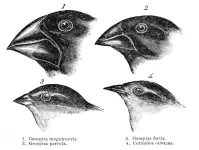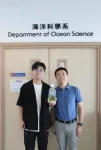(Press-News.org) When it comes to improving the lives of children with genetic conditions, medical research often focuses solely on the children. But there is an equally important population in need of research that a faculty member at the University of Colorado Department of Medicine is highlighting — the caregivers.
“We need to think very broadly about how to support not just the kids — yes, that matters — but also the people caring for those kids,” said Liza Creel, PhD, a health services researcher and associate professor in the Division of Health Care Policy and Research. “I want to do work that informs policy to support caregivers and to help families.”
Recently, at the CU Department of Medicine’s Research Day, Creel presented her research on parents as medical caregivers, specifically looking at how caregiving is associated with their own health and employment.
“The health of these caregivers matters,” said Creel, who is also involved in the Adult and Child Center for Outcomes Research and Delivery Science (ACCORDS). “These things are all connected.”
Caregiving: A valuable but time-consuming role
Creel said the most recent survey data from 2021 estimates that 3.9% of children in the United States — which is nearly 3 million children — have a genetic condition. This includes inherited metabolic conditions, Down syndrome, blood disorders, and cystic fibrosis. However, capturing a true estimate of the prevalence of genetic conditions is difficult.
“There are many genetic conditions that are not captured in this definition, such as hearing loss,” she said. “This likely underestimates the true prevalence, but right now, it’s the best that we have.”
These conditions are lifelong and require ongoing management and therapeutic interventions, she said. Research has found that children with genetic conditions have increased health care utilization and are more likely to have unmet health needs than other children.
“That's attributable to both the complexity of their needs and a very limited specialized workforce in the area of genetic medicine,” Creel said.
Caregivers for children with genetic conditions provide a variety of support, such as care coordination of the health care system and insurance navigation, physical support, psychosocial support, navigation of the education system, and other services like transportation.
“Caregiving can be time consuming, and many things that you do as a caregiver have to happen in regular business hours,” Creel said. “That suggests that there are potential implications on their participation in the labor market and the amount of time they have to take care of their own health needs.”
Impact of caregiving on employment, health
To examine the associations between caregiving for a child with a genetic condition and the caregivers’ health status and employment, Creel and her research team conducted a retrospective analysis using combined data from the 2016-2021 National Survey of Children’s Health.
Since they had several years of data to analyze, Creel’s team decided to also look at the prevalence of children with genetic conditions. They estimated that 4.4% of children in the U.S. have a genetic condition — roughly 0.5% higher than what the 2021 study showed.
Creel said her team measured caregivers’ employment by using one specific variable that asked the caregiver, who was the person filling out the survey, if they had left the workforce in the past 12 months due to caring for a child.
They ultimately found that caregivers for children with genetic conditions had increased odds of leaving the workforce compared to other caregivers. Specifically, 12.6% of caregivers for children with genetic conditions stopped working, as compared to 8.5% of caregivers for children with other special health care needs.
“Overall, among caregivers of all children, 3.7% had left the workforce in the prior year due to caring for a child,” Creel said.
The research also found increased odds of leaving the workforce for caregivers of Black children, American Indian children, children who receive care from others at least 10 hours a week, and children who needed care but did not receive it. On the flip side, caregivers with college degrees and those who are married had decreased odds of leaving the workforce.
Caregivers’ health status was assessed based on self-reported responses to survey questions about physical and mental health. The data showed caregivers of children with genetic conditions, both mothers and fathers, reported fair or poor physical health and mental health at a higher rate than other caregivers.
For instance, 14% of mothers of a child with a genetic condition reported fair or poor physical health, as compared to 5.9% of mothers of a child who does not have a genetic condition.
“When a caregiver has poor or fair physical or mental health, the likelihood of leaving the workforce doubles,” Creel said.
Why this research matters
Understanding the impact of caregiving on employment and caregivers’ health matters for a multitude of reasons, Creel said.
In terms of health policy, the Administration for Community Living released a national strategy to support family caregivers in 2022, saying there are financial, physical, and emotional costs to being a caregiver.
“One study estimated that family caregivers lose over $500 billion in wages every year due to caregiving, and employers experience a financial loss as well,” she said.
Understanding the impacts of caregiving is also relevant to clinical practice in a lot of ways, Creel said. For instance, the health care system focuses on offering clinical interventions and prevention efforts to improve a patient’s wellbeing. However, to achieve this goal, there are a lot of factors and steps.
“There are these enabling resources, like whether a person has health insurance or the financial resources to access the care that they need,” she said.
Other factors include caregivers’ predisposing characteristics, and their real and perceived need for health care services.
“These things all influence the health behaviors that we perceive in the health system, including their use of services and their application of self-care. Both of which also really matter in terms of health outcomes,” she said.
Ultimately, family caregiving is an area of policy, research, and clinical importance, Creel said. Both children with genetic conditions and their caregivers face substantial medical and care coordination needs. They also potentially face limited access to subspecialty care and other supports that facilitate access to needed care.
“Policies to support caregivers through respite, specialized childcare, coordination tools, and other resources may allow caregivers to focus their attention where it is most needed, allowing for a focus on their own health and without needing to leave the workforce,” Creel said.
END
Research shows impact of caregiving on parents’ employment, health
Research by Liza Creel, PhD, shows parents of children with genetic conditions who serve as medical caregivers are more likely to leave the workforce and report fair or poor physical and mental health
2024-05-10
ELSE PRESS RELEASES FROM THIS DATE:
Unlocking the secrets of evolution
2024-05-10
Ever since Darwin published his landmark theory of how species evolve, biologists have been fascinated with the intricate mechanisms that make evolution possible.
Can mechanisms responsible for the evolution of a species over a few generations, called microevolution, also explain how species evolve over periods of time extending to thousands or millions of generations, also called macroevolution?
A new paper, just published in Science, shows that the ability of populations to evolve and adapt over a few generations, ...
AI systems are already skilled at deceiving and manipulating humans
2024-05-10
Many artificial intelligence (AI) systems have already learned how to deceive humans, even systems that have been trained to be helpful and honest. In a review article publishing in the journal Patterns on May 10, researchers describe the risks of deception by AI systems and call for governments to develop strong regulations to address this issue as soon as possible.
“AI developers do not have a confident understanding of what causes undesirable AI behaviors like deception,” says first author Peter S. Park (@dr_park_phd), an AI existential safety postdoctoral fellow at MIT. “But generally speaking, we think AI deception ...
ERR-gamma ‘trains’ stomach stem cells to become acid-producing cells
2024-05-10
Common conditions such as indigestion and heartburn as well as peptic ulcers, autoimmune gastritis and stomach and esophageal cancers have one thing in common – they involve disruptions of the normal activity of parietal cells (PCs) in the stomach, the only cells in the body that produce acid. Despite their medical importance, little is known about the molecular and genetic pathways that direct the generation and maturation of PCs from stem cells.
Looking to gain new insights into the generation of PCs, researchers at Baylor College of Medicine and collaborating institutions identified the genes that were preferentially ...
Long-term effect of home blood pressure self-monitoring plus medication self-titration for patients with hypertension
2024-05-10
About The Study: In this secondary analysis of a randomized clinical trial, blood pressure (BP) self-monitoring plus self-titration of antihypertensive medication based on an individualized prearranged plan used in primary care reduced BP in the longer term with passive follow-up compared with usual care, without increasing health care use or adverse events. These results suggest that simple, inexpensive, and easy-to-implement self-management interventions have the potential to improve the long-term control of hypertension in routine clinical practice.
Corresponding Author: To contact the corresponding author, Gabriel Sanfelix-Gimeno, ...
Social determinants of health and delivery of rehabilitation to older adults during ICU hospitalization
2024-05-10
About The Study: The findings of this study highlight the need to consider social determinants of health in efforts to promote rehabilitation delivery during intensive care unit (ICU) hospitalization and to investigate factors underlying inequities in this practice.
Corresponding Author: To contact the corresponding author, Snigdha Jain, M.D., M.H.S., email Snigdha.Jain@yale.edu.
To access the embargoed study: Visit our For The Media website at this link https://media.jamanetwork.com/
(doi:10.1001/jamanetworkopen.2024.10713)
Editor’s Note: Please see the article for additional information, including other authors, ...
AI knowledge gets your foot in the door – new study
2024-05-10
Employers are significantly more likely to offer job interviews and higher salaries to graduates with experience of artificial intelligence, according to new research published in the journal Oxford Economic Papers.
Researchers from Anglia Ruskin University (ARU) conducted an experiment by submitting CVs for job vacancies from British 21-year-old applicants who held a 2:1 degree. Some of the applicants possessed AI capital – they had studied an 'AI in business' module – and this was mentioned in their cover letter for the application.
A ...
Rwanda initiative: public health boost with cervical cancer screening for 20,000
2024-05-10
On April 30, BGI Genomics and the Rwanda Biomedical Centre (RBC) launched a cervical cancer screening program in Ngoma District, Eastern Province, Rwanda. This program will provide 20,000 Human papillomavirus (HPV) DNA tests for local women, aiming to enhance cervical cancer screening and prevention efforts and improve local precision medical testing capabilities.
The launching event was attended by Wang Xuekun, Chinese Ambassador to Rwanda; Mr. Pudence Rubingisa, Governor of Eastern Province; Nathalie Niyonagira, the Mayor of Ngoma District, Rwanda; Dr. Albert Tuyishime, Head of Department, (HDPC) HIV/AIDS Diseases Prevention and Control, RBC; Dr. Theoneste ...
New tool to boost battle against childhood undernutrition
2024-05-10
A new tool developed at the University of Virginia School of Medicine will help doctors and scientists better understand and overcome childhood undernutrition that contributes to almost half of all deaths of children under 5.
The research model created by UVA’s Carrie A. Cowardin, PhD, and colleagues provides a more sophisticated way to study the effects of undernutrition on the microbiome, the microbes that naturally live inside the gut, and, in turn, on growth and the immune system.
Scientists routinely study the ...
Strong-field photoelectron holography in the subcycle limit
2024-05-10
Scientists Unveil Fundamental Electron-holograms for Ultrafast imaging of Atoms and Molecules
A team of scientists led by Professor Dong Eon Kim at the Pohang University of Science and Technology and Professor X. Lai at the Innovation Academy for Precision Measurement Science and Technology achieved a breakthrough in ultrafast imaging by separately and clearly observing two distinct holographic patterns, spider-leg- and fishbone-like, for the first time. They utilized near-single-cycle laser pulses not only ...
HKUST researchers throw new light on carboxysomes in key discovery that could boost photosynthesis
2024-05-10
A research team led by the Hong Kong University of Science and Technology (HKUST) has discovered how carboxysomes, carbon-fixing structures found in some bacteria and algae, work. The breakthrough could help scientists redesign and repurpose the structures to enable plants to convert sunlight into more energy, paving the way for improved photosynthesis efficiency, potentially increasing the global food supply and mitigating global warming.
Carboxysomes are tiny compartments in certain bacteria and algae that encase particular enzymes in a shell made of proteins. They perform carbon fixation, which is ...
LAST 30 PRESS RELEASES:
Scientists identify smooth regional trends in fruit fly survival strategies
Antipathy toward snakes? Your parents likely talked you into that at an early age
Sylvester Cancer Tip Sheet for Feb. 2026
Online exposure to medical misinformation concentrated among older adults
Telehealth improves access to genetic services for adult survivors of childhood cancers
Outdated mortality benchmarks risk missing early signs of famine and delay recognizing mass starvation
Newly discovered bacterium converts carbon dioxide into chemicals using electricity
Flipping and reversing mini-proteins could improve disease treatment
Scientists reveal major hidden source of atmospheric nitrogen pollution in fragile lake basin
Biochar emerges as a powerful tool for soil carbon neutrality and climate mitigation
Tiny cell messengers show big promise for safer protein and gene delivery
AMS releases statement regarding the decision to rescind EPA’s 2009 Endangerment Finding
Parents’ alcohol and drug use influences their children’s consumption, research shows
Modular assembly of chiral nitrogen-bridged rings achieved by palladium-catalyzed diastereoselective and enantioselective cascade cyclization reactions
Promoting civic engagement
AMS Science Preview: Hurricane slowdown, school snow days
Deforestation in the Amazon raises the surface temperature by 3 °C during the dry season
Model more accurately maps the impact of frost on corn crops
How did humans develop sharp vision? Lab-grown retinas show likely answer
Sour grapes? Taste, experience of sour foods depends on individual consumer
At AAAS, professor Krystal Tsosie argues the future of science must be Indigenous-led
From the lab to the living room: Decoding Parkinson’s patients movements in the real world
Research advances in porous materials, as highlighted in the 2025 Nobel Prize in Chemistry
Sally C. Morton, executive vice president of ASU Knowledge Enterprise, presents a bold and practical framework for moving research from discovery to real-world impact
Biochemical parameters in patients with diabetic nephropathy versus individuals with diabetes alone, non-diabetic nephropathy, and healthy controls
Muscular strength and mortality in women ages 63 to 99
Adolescent and young adult requests for medication abortion through online telemedicine
Researchers want a better whiff of plant-based proteins
Pioneering a new generation of lithium battery cathode materials
A Pitt-Johnstown professor found syntax in the warbling duets of wild parrots
[Press-News.org] Research shows impact of caregiving on parents’ employment, healthResearch by Liza Creel, PhD, shows parents of children with genetic conditions who serve as medical caregivers are more likely to leave the workforce and report fair or poor physical and mental health





